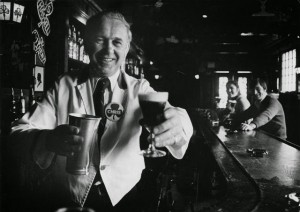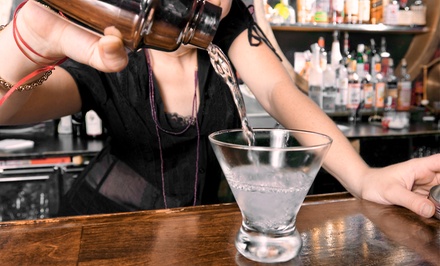
A Bartender Greets You With a Smile
Where has hospitality gone? When I started out working in the front of the house customer service was job one. I miss those days.
Nowhere has hospitality taken such a steep decline than behind the bar. The bartender was the beating heart of the bar and restaurant. They most often earned their spot behind the bar for their ability to handle pressure with a smile and make the establishments patrons feel like guests. They could do this all while also handling the demands of the waitstaff (which is no small feat).
A bartender wasn’t judged by their ability to cut ice or how effortlessly they could stir a drink. The great bartender is the unofficial mayor of his town, a sparkling conversationalist, an expert in reading people and situations, and someone how always appears to be in command. I miss that bartender. Granted, I do see him or her on occasion and when I do I’m simply overjoyed. There is no happier place than in the care of a great bartender.
Today, bartending has changed. There are several factors contributing to a general shift away from hospitality.
Perhaps chief among them is the cultural shift. People, especially anyone under 35, have been brought-up tethered to a digital device. This device, a smartphone, and what is happening on it is more important than their surroundings and the people in their company. Just observe a group of twenty-somethings in a bar. Far more time is spent focused between their thumbs than on the friends who have joined them. It’s just a simple fact and a definite sign of the times. How this affects hospitality is rather direct. When direct human interaction is rare, and often purposely avoided, the result is a person often lacking “people skills.” At the basis of hospitality is, and always will be, people skills.
Another contributing factor to declining bartending skills is mixology. How can this be you may ask? Aren’t they the same thing? Absolutely not!

Hospitality Once Included a Look in the Eye
The cocktail renaissance has brought us a multitude of good. Serving tasty drinks made with quality spirits and fresh ingredients is certainly a good thing and a huge plus on the hospitality meter. The issue is that far too many bartenders are more concerned with the revolutions in their Manhattans than the person who will be drinking it. Good technique is important but I would trade it every time for a bartender that looks me in the eye, makes my wife feel special, and can pick up the conversation as it was left the last time I departed the establishment.
When you couple these two factors: lacking people skills and a focus on technique, you arrive at someone occupying a position that was once the hospitality center of the universe and replaced it someone who fancies themselves as an artist. Further exasperating the situation by a lack of hospitality-focused training and you have effectively killed the unique environment that the bar once offered.
So detached from the art of hospitality are many in the trade these days that a horrific and damaging trend has risen. Try “googling” the phrase “bartenders hate” or “things that annoy a bartender” and so on. If you are frequenting social media and especially if this is coupled with a life in the bar industry you have seen many examples of post like this. I see this type of post regularly and it always makes me cringe.
It is well understood that when serving the public that you encounter difficult and sometime outright rude customers. That’s part of the gig. If you are a patron in a bar snapping your fingers at the bartender, waving money over your head, invading their personal space, and generally being an impatient ass I wish that I could just ask you to stop. However, it’s unlikely to have any effect as you are probably a burden to your co-workers, family, and anyone that mystifyingly calls you friend.
Writing on how customers are to behave and not behave, making videos on the subject, or simply sharing these posts create an environment that is damaging to the concept and practice of hospitality. Yes, I understand venting. This current fad goes beyond venting. What it does is create an us versus them environment with you, the bartender, as the superior being in need of being impressed in order for you to serve your invaluable creations.
The only thing that a bartender should hate is the customer not walking through the door and if you’re really good you hate them walking out your door being anything less than 100% satisfied.
But all is not grim. I do occasionally see the “old school” bartender. They are not extinct and chances are that you know one and you treasure them. Further, it’s always important to remember that the pendulum does swing in both directions and lately I am seeing a good number of bar owners and managers shifting attention to the primary goal, customer service and good, old fashioned hospitality. It’s obtainable.

Aack Sean, I’m so with you. There’s an invisible zone I’m in at the majority of the bars; not sure what I’m to do to impress the bartender enough to offer a drink, and I’m a blond! On occasion I do think there’s hope though. In NYC recently we sat and had dinner at the bar, and the bartender – maybe early 30s – was so engaging and old school as you say… Hope his bosses recognize the ace they’ve got.
This is so on point. I appreciate a beautifully mixed and served drink, but there MUST be some human connection for this transaction to work. “Mixologists” are far too often only frustrated laboratory assistants, NOT “masters of the house”. A great bartender ALWAYS gets a great tip and a return visit!
I have often pointed out that I have not heard a bar joke from a bartender in perhaps over a decade. I love that bartenders are so much more knowledgeable on their spirits & cocktails now than when I bartended in the 90s, but many of them have taken on a superior air to them that all that becomes a moot point if a patron isn’t having fun sitting at the bar.